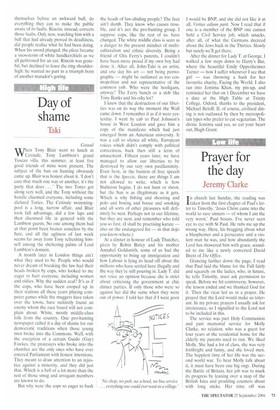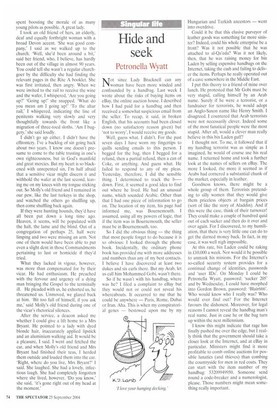Prayer for the day
Jeremy Clarke
I n church last Sunday, the reading was
taken from the first chapter of Paul's letter to Timothy. 'Jesus Christ came into the world to save sinners — of whom I am the very worst,' Paul boasts. I've never seen eye to eye with St Paul. He rubs me up the wrong way. Here, his bragging about what a blasphemer and a persecutor and a violent man he was, and how abundantly the Lord has showered him with grace, sounded to me like a newly converted David Brent of The Office.
Glancing further down the page, I read that Paul laid the blame for the Fall fairly and squarely on the ladies, who, in future, he tells Timothy, must ask permission to speak. Before we hit controversy, however, the lesson ended and we thanked God for it. Then the vicar led us in a prayer. He prayed that the Lord would make us tolerant. In my private prayers I usually ask for intolerance, so I signalled to the Lord not to be included in this.
The service was part Holy Communion and part memorial service for Molly Clarke, no relation, who was a guest for four years at the residential home for the elderly my parents used to run. We liked Molly. She had a lot of class, she was very forthright and funny, and she loved men. The happiest time of her life was the second world war. To hear Molly talk about it, it must have been one big orgy. During the Battle of Britain, her job was to mark its progress by leaning over a map of the British Isles and prodding counters about with long sticks. Her time off was spent boosting the morale of as many young pilots as possible. A great lady.
I took an old friend of hers, an elderly, deaf and equally forthright woman with a broad Devon accent. She was good company,' I said as we walked up to the church. 'Well, she'd been around a bit,' said her friend, who, I believe, has hardly been out of the village in almost 90 years. You could tell she wasn't a regular churchgoer by the difficulty she had finding the relevant pages in the Rite A booklet. She was first irritated, then angry. When we were invited to the rail to receive the wine and the wafer, I whispered, 'Are you going up?' Going up?' she snapped. 'What do you mean am I going up!' To the altar rail,' I whispered, indicating the line of penitents walking very slowly and very thoughtfully towards the front like a migration of three-toed sloths. 'Am I buggery,' she said loudly.
I didn't go up either. I didn't have the effrontery. I've a backlog of sin going back about two years. I know one doesn't presume to come to the table trusting in one's own righteousness, but in God's manifold and great mercies. But my heart is so blackened with unrepented sin, I'm half afraid that a sensitive vicar might discern it and withhold the wafer at the last second, leaving me on my knees with my tongue sticking out. So Molly's old friend and I remained in our pew, like the last turkeys in the shop, and watched the others go shuffling up, then come shuffling back again.
If they were hunting hounds, they'd have all been put down a long time ago. Heaven, it seems, will be populated with the halt, the lame and the blind, Out of a congregation of perhaps 25, half were limping and two were missing an arm. Not one of them would have been able to put even a slight dent in those Commandments pertaining to lust or homicide if they'd tried.
What they lacked in vigour, however, was more than compensated for by their vicar. He had enthusiasm. He preached with the fervour and urgency of a dying man bringing the Gospel to the terminally ill. He pleaded with us, he exhorted us, he threatened us. Unmoved, we glared back at him. 'Bit too full of himself, if you ask me,' said Molly's old friend during one of the vicar's rhetorical silences.
After the service, a deacon asked me whether I could give a lift home to a Mrs Bryant. He pointed to a lady with dyed blonde hair, inaccurately applied lipstick and an aluminium walking aid. It would be a pleasure, I said. I went and fetched the car, and when Molly's old friend and Mrs Bryant had finished their teas, I herded them outside and loaded them into the car. 'Right, where do you live, Mrs Bryant?' I said. She laughed. She had a lovely, infectious laugh. She had completely forgotten where she lived, however. 'Do you know,' she said, 'it's gone right out of my head at the moment.'



























































































 Previous page
Previous page